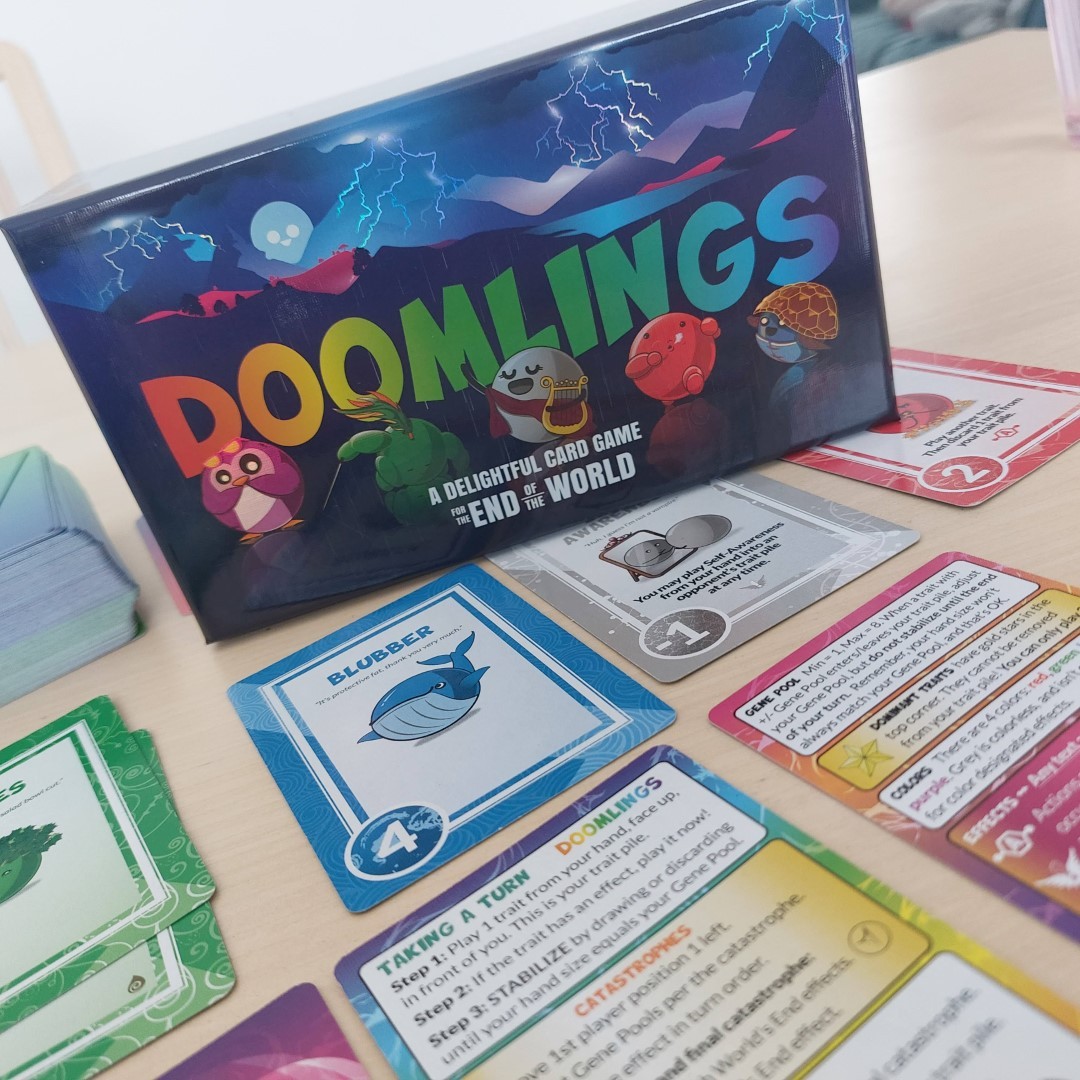Doomlings is a game about building a quirky, evolving species on the brink of an apocalypse, after all you need to score as many points as possible before the world’s end. With its bright artwork and promises of competitive play, it sounds like the perfect blend of light-hearted fun and clever mechanics – how else would it achieve competitive play.
However, after a few rounds, it became increasingly clear that there’s more luck here than you’d find in a dice roll and found myself feeling more frustrated than entertained. But if its a light hearted game your after, Doomlings has its place, but competitive card game it is not.
Doomlings is a card game for 2-6 players, your goal is to build a species through traits over a series of rounds by stacking up trait cards, all while facing down random catastrophic events that threaten to end your hard work. The aim is to collect points from your traits before the world inevitably ends. Sounds straightforward, right?
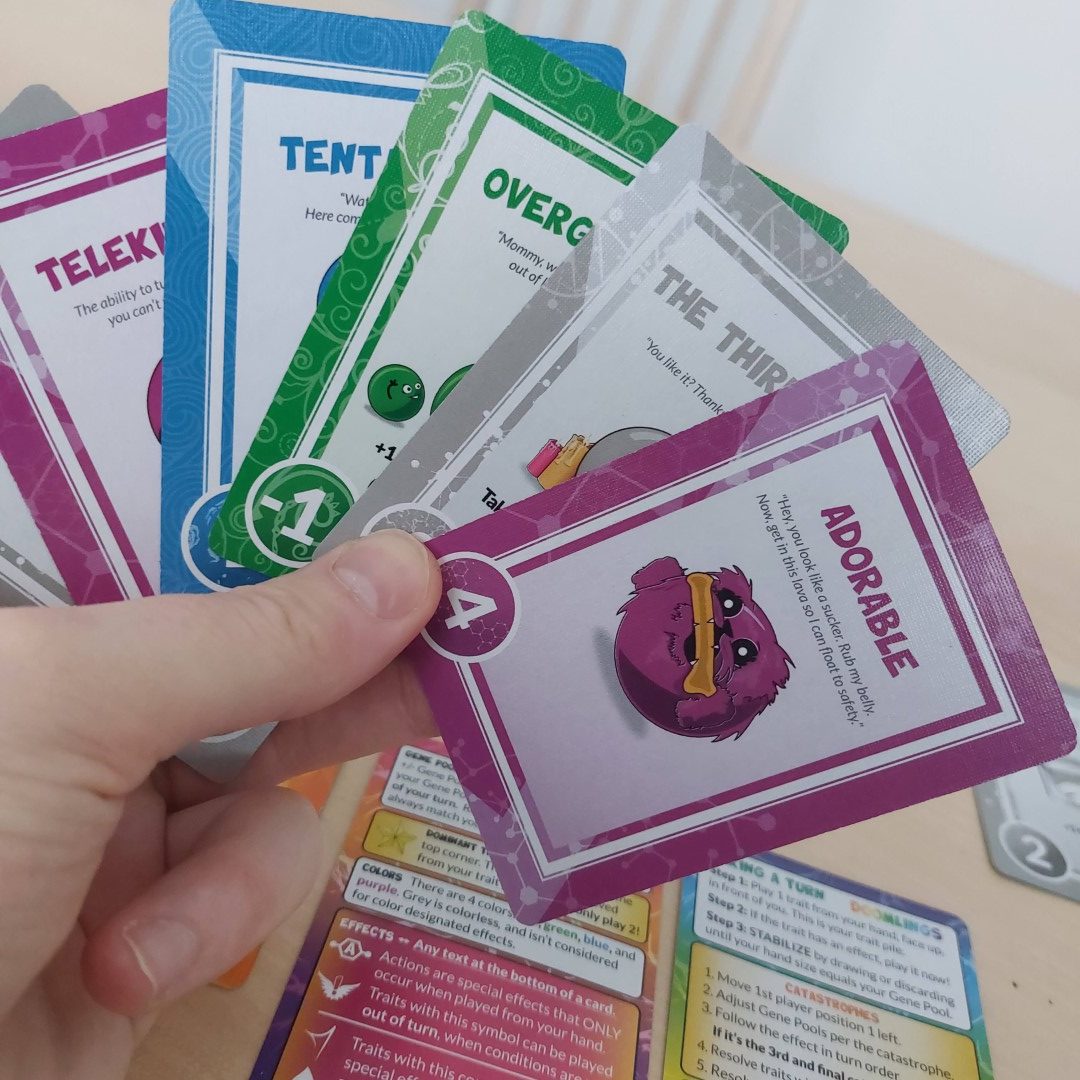
Unfortunately, Doomlings tries to keep things simple but ends up feeling erratic and unpredictable, to the point where strategy is often drowned out by randomness. There are three types of cards in Doomlings traits, ages and gene pool card – which essentially determine hand size.
A game turn is simple, at the start of the round, flip an age card, resolve its effects, which can be anything from swapping hands, discarding cards, reducing hand size to drawing cards, there’s a huge variance here, that makes it difficult to plan. Each player then in player order plays a trait card from their hand. At this point you might resolve the effects of a trait card if it has an action – as these only happen when played.
After your turn, you’ll then check how many cards you have in your hand, and whether this is equal to your gene pool, more often than not you’ll need to draw up. – Weirdly Doomlings sells Gene pool as a “twist” to hand management, and I’m not sure if I’d call that anything new or a twist on hand management. You then repeat this over 12 rounds. I personally think action cards, maybe needed to be renamed instant effects?
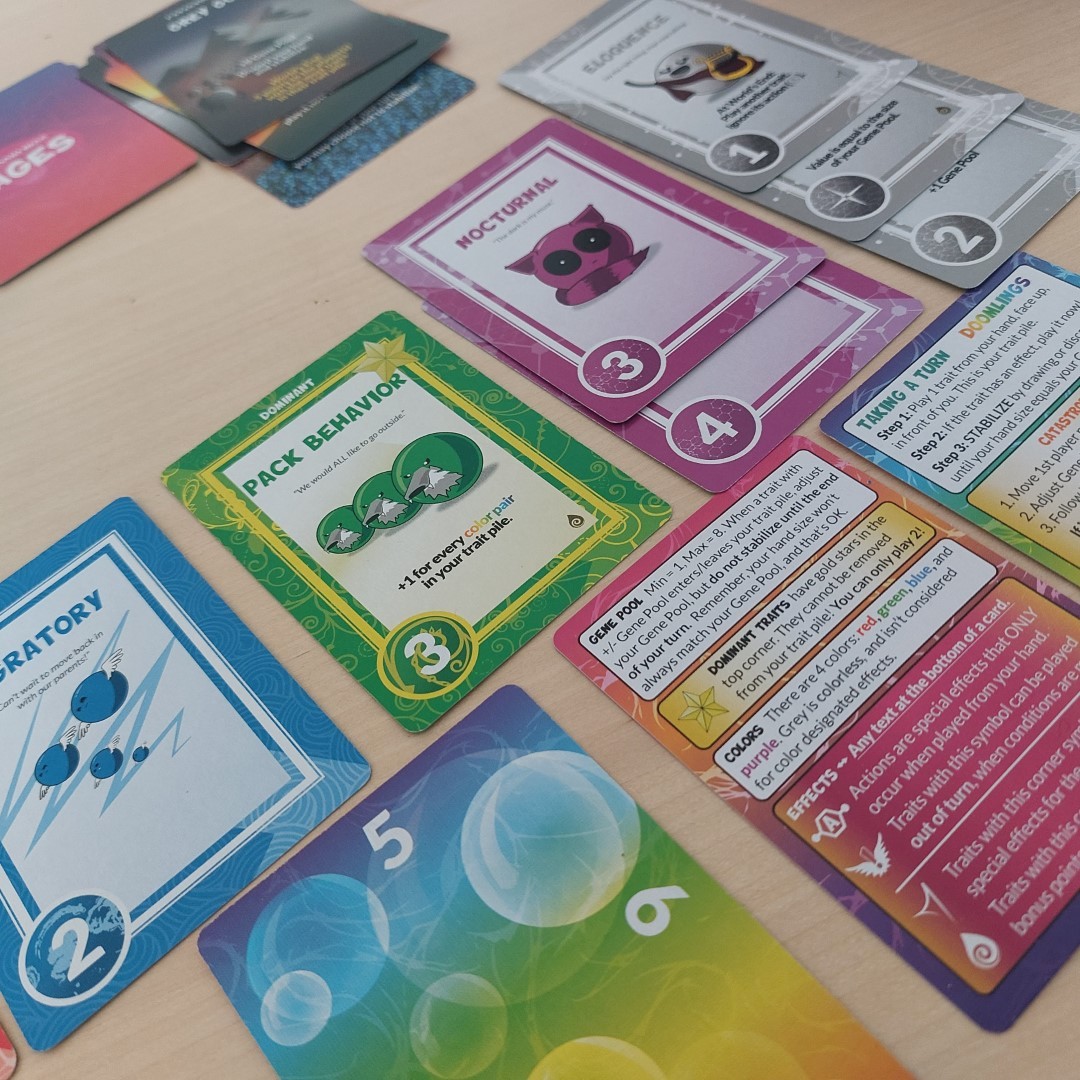
To give credit where it’s due, the artwork in Doomlings is relatively charming. The illustrations are colourful, playful, and packed with personality, each trait card has a unique illustration, which adds some visual appeal and variety.
When it comes to replayability, Doomlings tries to sell itself on variety—after all, with over 100 trait cards, including traits that are permanent (dominant traits) and regular traits, there’s also numerous events (age cards), so each game is technically different. But after a few rounds, the novelty wears off fast – although I think this novelty will last for families. The catastrophic cards create such extreme swings in the game that you can’t really build on any previous experience.
One game might let you rack up points through resilience-focused traits, while the next wipes out everyone’s progress without warning. The unpredictability sort of feels fresh at first, but it quickly turns repetitive. It’s like playing the same game of chance over and over, with little room to actually hone a strategy.
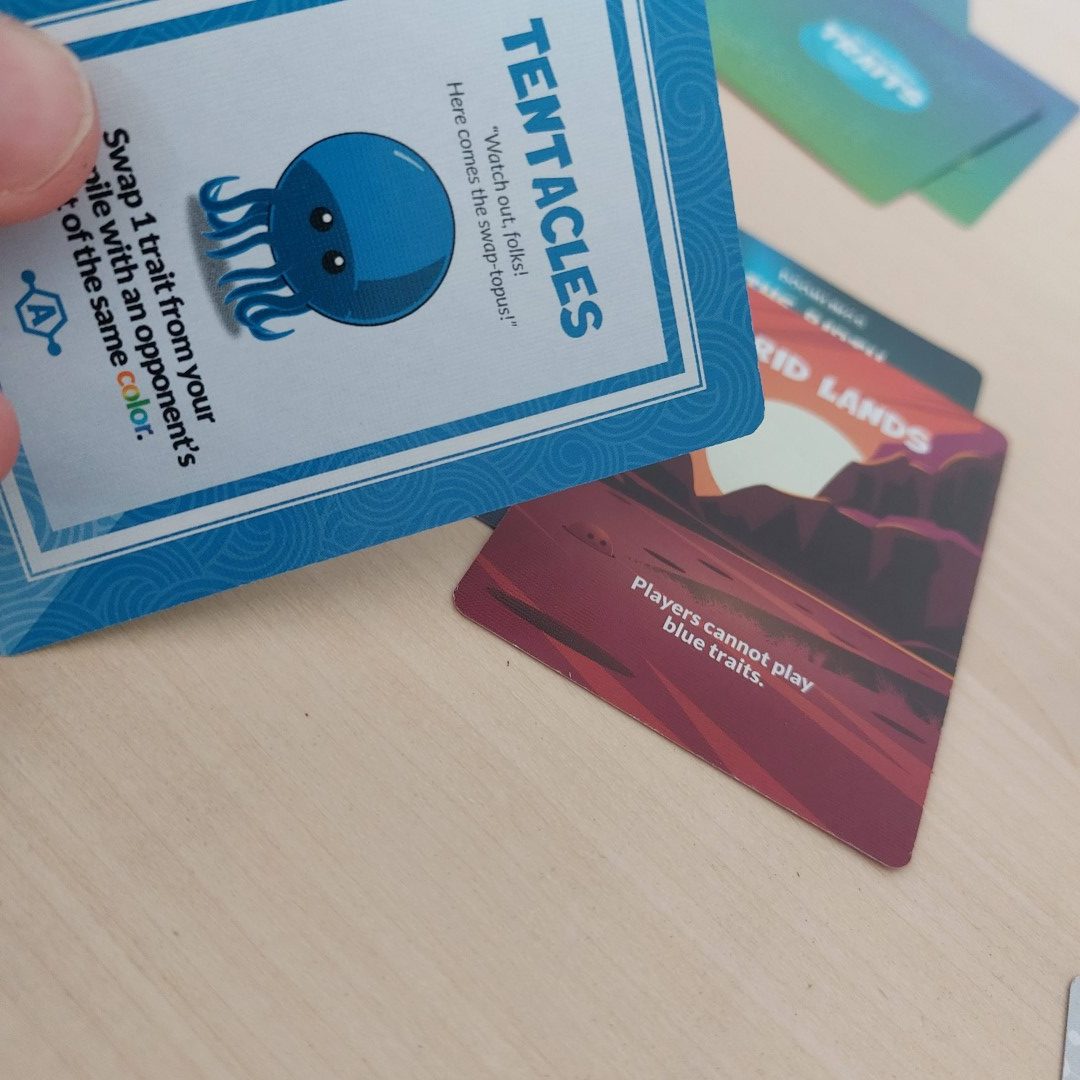
With a smaller group of two or three, Doomlings feels especially flat. While the game can work with fewer players, it lacks the tension that larger groups bring – if that’s the sort of thing you enjoy. With only two players, for instance, the age cards lose a bit of their punch, and the randomness becomes even more glaring, as a group you’ll see so few cards, the game becomes self limiting. This is clearly a game designed with four or more players in mind, and it doesn’t work in a smaller setting.
One of the biggest problems with Doomlings remains the balance—or rather, the lack of it. The gameplay is fast-paced, yes, but it’s also relentlessly chaotic and that won’t be for everyone. You spend rounds carefully stacking up traits, only for an age card to throw your plans out the window. On paper, this sounds fun and suspenseful, but in practice, it’s more frustrating than anything.
You’ll often find yourself building a powerful species, only for a catastrophe card to ruin your entire game in one move, with little chance of recovering. And I’m really struggling to see where the competitive play comes into Doomlings, because a) the game can last anywhere from 20-45 minutes (depending on players) and there’s so much randomness here, any balanced playing field feels like a competitive challenge in itself.
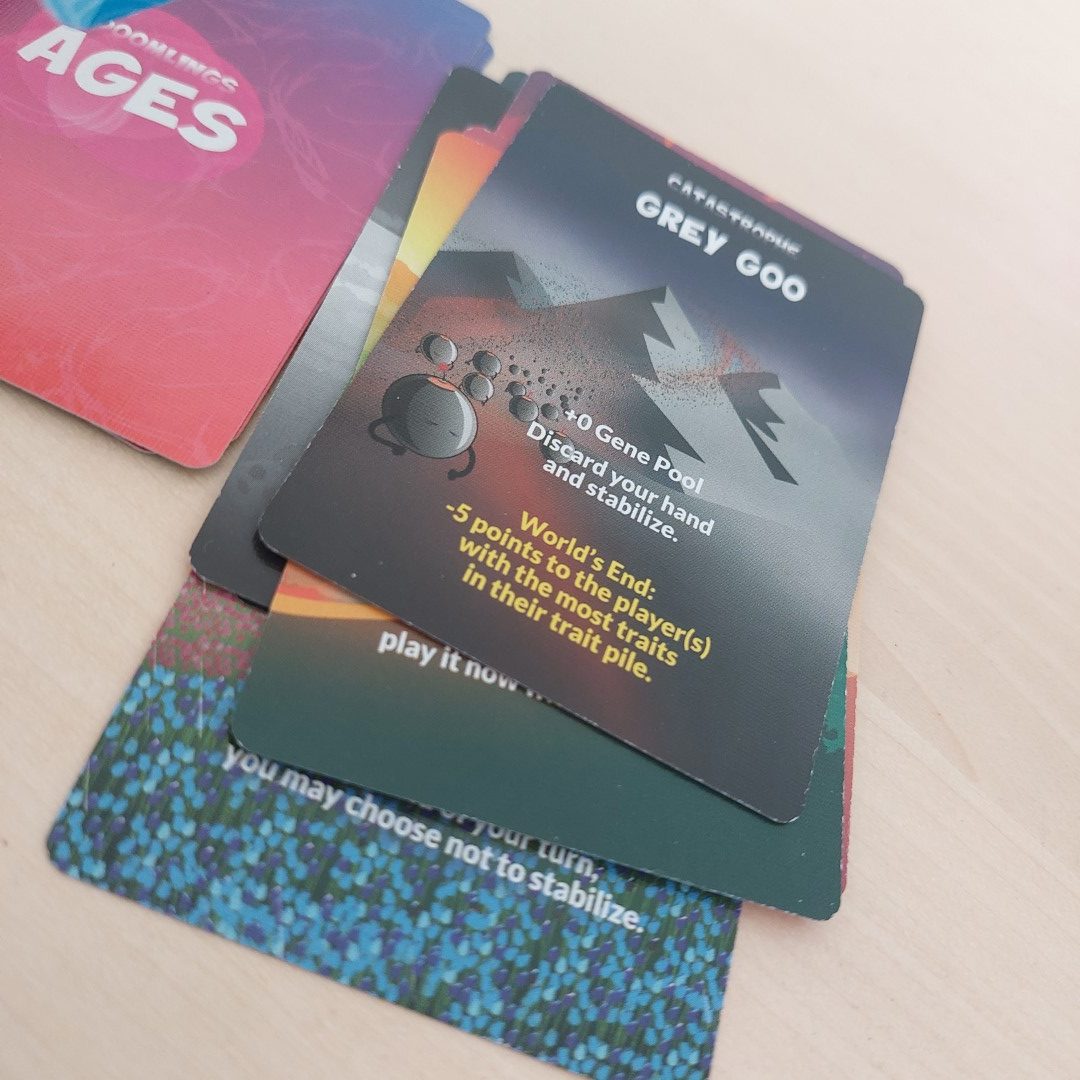
The trait cards themselves are another mixed bag. Some are incredibly powerful, letting you stack up points quickly, while others have minimal impact, whilst others have instant effects. Because of this inconsistency, certain games will see players race ahead simply by luck of the draw, while others are left scrambling for viable options. While there’s theoretically a strategic element to choosing traits, the lack of balance means that your success is largely dictated by what you happen to pull from the deck. For a game that claims to focus on strategy, Doomlings ultimately feels disappointingly arbitrary.
In theory, Doomlings has a lot going for it—a unique concept, fun artwork, and easy-to-grasp rules. But in execution, it falls flat for a group of gamers. The game markets itself as a strategic competitive card game and a light party game, but it doesn’t excel as a strategy game. Its chaotic nature is entertaining for a round or two and that’s where Doomlings will likely find a home, but it lacks the depth and balance needed to make it a true staple in any game night lineup. However, I think that game will work suprisingly well at a family game night
As you know, I rate games on a scale of:
Buy or play
Wait for sale or play if you like game XYZ
Avoid
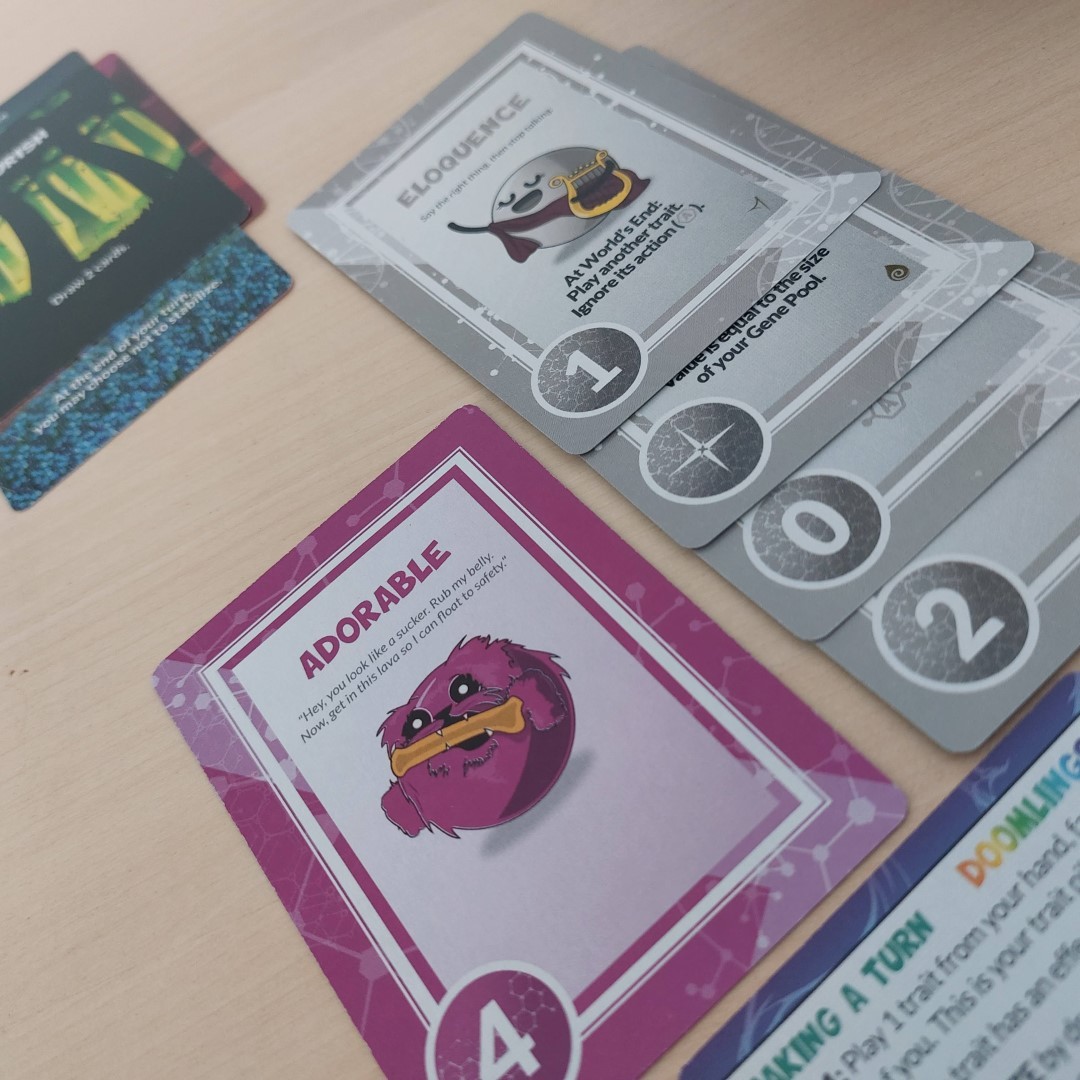
For players who thrive on strategy and competitive play, Doomlings will feel unsatisfying and shallow. It’s not a game where careful planning and skill are rewarded; instead, it’s one where you’re constantly at the mercy of luck and that probably makes it great for a family game night. Even if you try to optimise your turns, you’ll be left in the hands of luck, which can see your species taken out of your control or that perfect hand given away. The randomness overshadows any potential strategy, and the imbalanced trait cards make it difficult to feel like you’re building something meaningful.
If you’re after a quick, light-hearted game with a heavy dose of luck and a bit of silliness, Doomlings is worth a try and that gives Doomlings a “wait for sale or play if you enjoy light hearted party style games”. But if you’re hoping for something beyond a light hearted card game, this game likely won’t hold your attention for long. It’s fun embracing chaos, but ultimately it’s a question of how long can that fun last? Doomlings feels more like a novelty than a mainstay in a collection, unless you’re looking for a new light hearted game for family game night. In the end, this game’s over-reliance on randomness and lack of balance left me feeling more frustrated than fulfilled.


